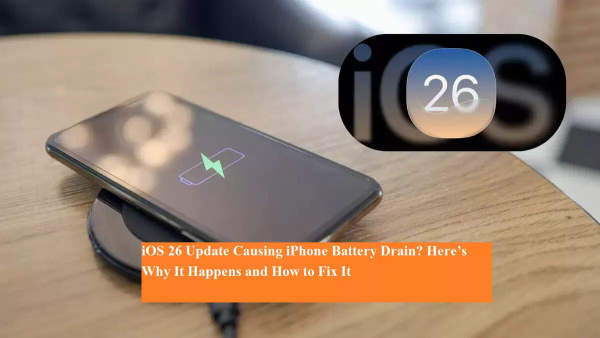
New Delhi, October 4, 2025: Apple’s latest iOS 26 update has rolled out globally, bringing several new features and improvements. However, a large number of iPhone users are reporting serious issues after updating their devices. The most common complaint is faster battery drain, even with light usage. Some users also noticed their phones heating up and apps running slower than usual.
While these problems sound concerning, experts suggest that such issues are often temporary and can be managed with a few adjustments. Here’s a detailed look at why your iPhone’s battery might be draining faster after the iOS 26 update and what you can do to fix it.
Experiencing reduced battery life after a major iOS update is not unusual. When a new version is installed, the system performs several background processes, such as:
Re-indexing files and photos
Optimizing installed apps
Syncing data across Apple services
These tasks temporarily increase power consumption, leading to faster battery drain. The good news is that these processes usually stabilize within a few hours or a couple of days, after which the battery life returns to normal.
Background Processes: As mentioned, file indexing and system optimization consume extra power in the initial phase.
Adaptive Power Mode: iOS 26 includes features that automatically adjust performance to save energy, which might make the phone feel slower and give an impression of poor battery performance.
Outdated or Incompatible Apps: Apps that haven’t been updated to work smoothly with iOS 26 may consume more energy than usual.
Old Battery: iPhones with older batteries are more prone to rapid discharge, regardless of software updates. If your battery health is already below 80%, the update may worsen performance.
If you’re struggling with quick battery drain after updating, here are some effective solutions:
After updating, let your iPhone complete background tasks. Battery usage usually stabilizes within 24–48 hours.
This feature helps save energy by slightly reducing performance. You can find it in Settings > Battery.
Check the App Store for pending updates. Outdated apps may not be optimized for iOS 26 and can drain the battery faster.
Go to Settings > Battery to see which apps consume the most power. Remove or limit usage of unnecessary apps.
Lower screen brightness or enable Auto-Brightness.
Disable Always-On Display if available.
Use Dark Mode to reduce power consumption.
Shorten Auto-Lock duration and reduce animation effects.
Turn off location services for non-essential apps.
Restrict Background App Refresh to Wi-Fi only or disable it.
Allow push notifications only for important apps.
Turn off AirDrop, Bluetooth, or Wi-Fi when not needed.
Disable Raise to Wake.
Keep Low Power Mode enabled if battery issues persist.
Avoid exposing your iPhone to high temperatures, as heat accelerates battery drain.
Navigate to Settings > Battery > Battery Health to check maximum capacity.
If battery health is below 80%, replacement is recommended.
Even with software fixes, an old battery will continue to drain quickly.
While many iPhone users are worried about faster battery drain after the iOS 26 update, the issue is often temporary. Background system processes, outdated apps, and older batteries are the most likely culprits. By adjusting settings, updating apps, and monitoring battery health, users can significantly improve performance.
If the problem continues despite trying all fixes, getting the battery replaced or waiting for Apple’s next minor update could be the best solution.